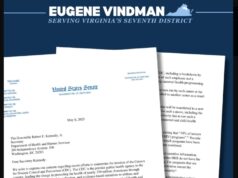cross-posted from Main Street Insider
Last week, in part one of our two-part series on filibuster reform, we examined the Constitutional Option to allow majority approval of rules changes. This week, in the 15th and final episode of Season 1,we look at the most prominent package of rules changes discussed to date. Roughly a month ago, Senator Jeff Merkley (D-OR) circulated a “dear colleague” memo outlining a series of changes that are being strongly considered within current Democratic Caucus deliberations.
Enjoy this first season’s finale. It’s been a fun season for us and we’ll be back in January with a whole slate of brand new bills and other policy proposals to summarize!
*Full disclosure: David Waldman, our Public Affairs Director, is an active advisor to the Fix the Senate Now coalition.
Senate Rules Reform and the 112th Congress
Part 2 of 2: The “Merkley Proposal”
Key Proponent: Sen. Jeff Merkley (D-OR)
Released 11/16/2010
Click here to download this summary (pdf)
Status: Currently in discussion within the Senate Democratic Caucus, this proposal has emerged as the most prominent and feasible comprehensive rules reform measure. If the Democratic majority exercises the Constitutional Option on the first day of the 112th Congress, they will have an opportunity to reform the filibuster rules with simple majority support. The Democratic Caucus will have 53 members at the time, including Independent Sens. Lieberman and Sanders, so they can only afford to lose three members if no Republicans support the measure. It is currently unclear whether proponents will be able to garner majority support.
Purpose: The Senate has been traditionally known as the deliberative “cooling saucer” of the American government, where the minority right to filibuster can counteract the worst impulses of a majority. But now, in a time of great national distress, many view the filibuster as an enabler of mindless obstruction rather than a tool to promote debate and compromise. Indeed, the percentage of legislation affected by threatened or actual filibusters has risen from 8% in the 1960s to some 70% in the 110th Congress.
Introduced on November 16th in a letter to Senate colleagues, Senator Merkley’s proposal is designed to accommodate those who believe the rules must be changed to limit obstruction, but do not support outright elimination of the right to filibuster.
Summary: The reform proposal contains a number of suggestions designed to decrease paralysis, increase deliberation and return the filibuster to its traditional role as conceptualized in the 1939 film “Mr. Smith Goes to Washington”. It includes suggestions to:
1) Eliminate the ability to filibuster the following:
• Motions to proceed to debate;
• Legislative amendments;
• Appointment of conferees;2) Shift the burden to the filibustering senators by requiring:
• A petition signed by a “substantial” number of senators to block a majority vote;
• A specific, gradually increasing number of filibustering senators to be present on the floor to keep debate open;
• Continuous debate during a filibuster. If no senator wants to speak at a given time, regular order is immediately restored;3) Create an similar expedited process for nominations;
4) Establish a minority right to offer legislative amendments;
5) Decrease the partisan segregation of members.
Expected Supporters: Many Senate Democrats, Fix the Senate Now coalition, dozens of constitutional scholars, etc.
• Supporters believe filibuster reform to be crucial to meeting the nation’s critical economic, energy/environmental, foreign policy and national security goals. While supporters are split on eliminating the right to filibuster entirely, they all favor provisions that “make them actually filibuster” and limit procedural delay on noncontroversial items of business.
Expected Opponents: Most Senate Republicans, movement conservatives, retiring Sen. Chris Dodd
• Some opponents recoil at the calls to upend longstanding practice in a legislative body primarily defined by its adherence to tradition, believing it is better to change the culture to inspire cooperation than to change the rules for short-term gain. However, others simply wish to preserve the ability to obstruct their political opponents’ agenda in the 112th Congress.
Note: For the most part, concrete support and opposition has yet to fully materialize
Further links:
Merkley Memo: Thoughts on the Reform of Senate Procedures: http://voices.washingtonpost.com/plum-line/Senate%20Procedures%20Reform%20Memo.pdf
Sen. Merkley interview with Rachel Maddow: http://www.youtube.com/watch?v=jo1Wa7gD7QU
Website of supporting coalition: http://fixthesenatenow.org/
Sen. Dodd’s farewell speech: http://dodd.senate.gov/multimedia/2010/SenatorDoddValedictoryAddress.pdf
Heritage Foundation commentary: http://blog.heritage.org/2010/12/02/an-astute-perspective-on-filibuster-reform/
Ezra Klein on the proposal’s promise: http://voices.washingtonpost.com/ezra-klein/2010/12/republicans_dare_democrats_to.html














![Monday News: Trump’s Lunacy Pushes China, Russia, India, etc. Together; “Happy Labor Day. Donald Trump and Elon Musk Are Screwing Workers.”; “Where is the [media’s] intense focus on Trump’s failing health?”; ““Trump says he is not a dictator. Isn’t he?”](https://bluevirginia.us/wp-content/uploads/2025/09/montage0901-100x75.jpg)